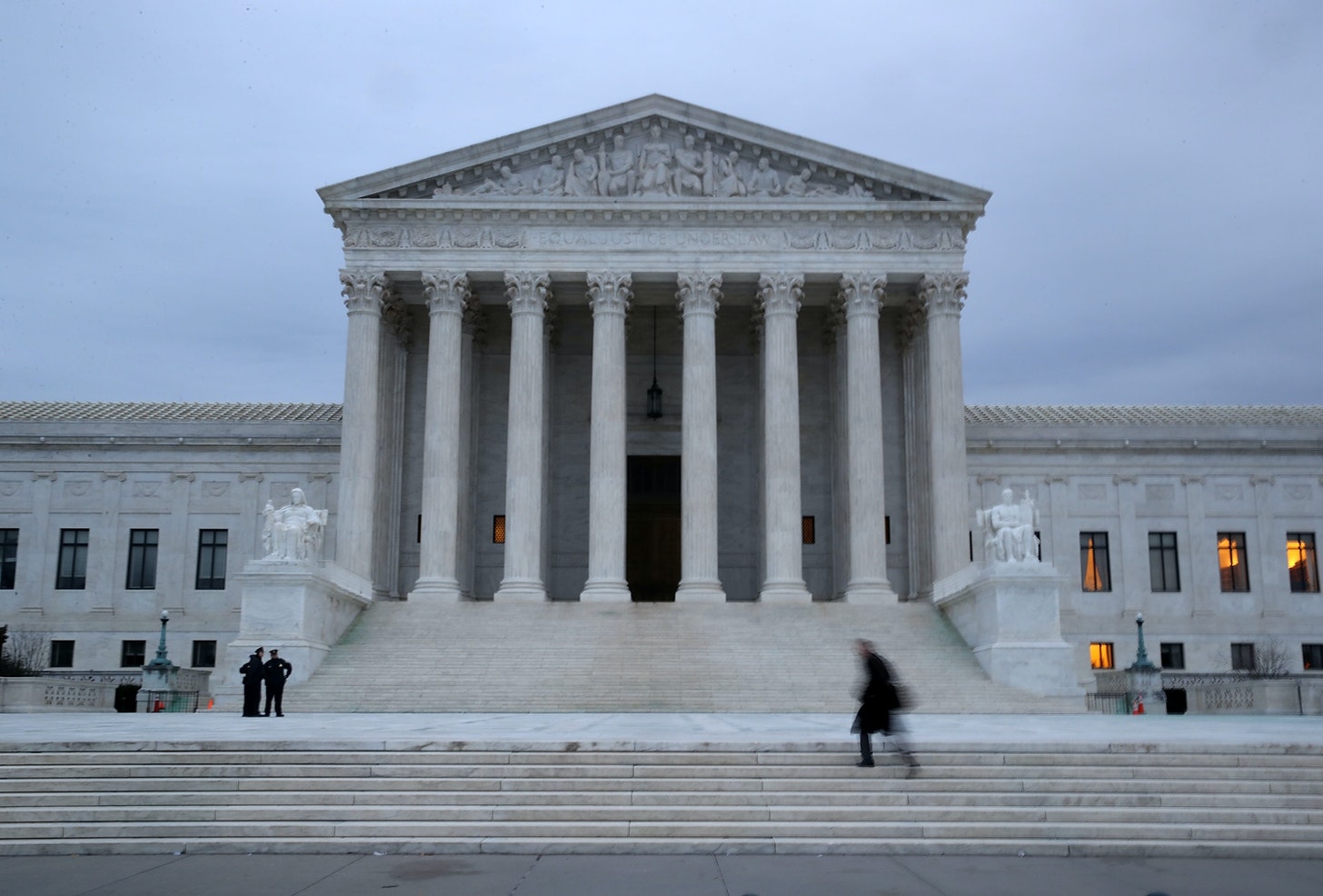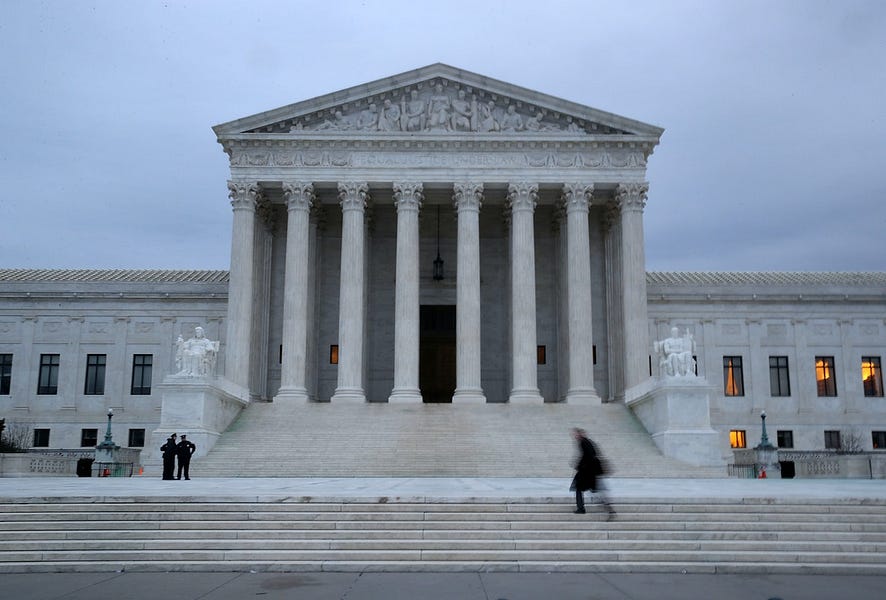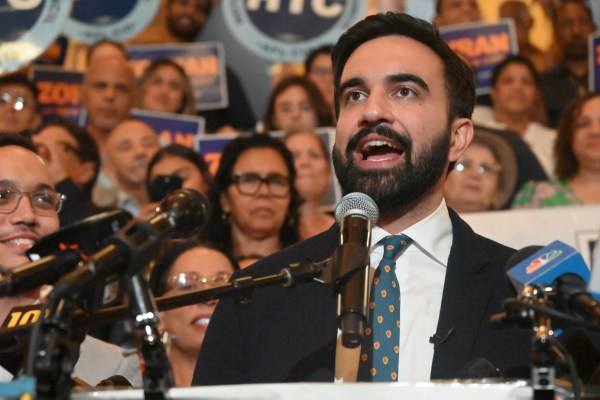Happy Friday! A couple pieces of housekeeping before we started:
-
Given the federal holiday, there will be no TMD on Monday. We hope you have a wonderful and safe Fourth of July weekend, and we’ll see you right back in your inbox on Tuesday.
-
After 458 days of data collection, we’re officially retiring the COVID-19 chart. We hope you found it served its purpose: Keeping you up-to-date on the constantly evolving shape of the pandemic. May it rest in peace.
Quick Hits: Today’s Top Stories
-
The Supreme Court ruled 6-3 on Thursday to uphold two Arizona voting restrictions that prohibit ballot harvesting and require residents to vote in-precinct. Democratic and activist groups had challenged the laws, alleging they disproportionately affected Arizona’s minority populations.
-
The Supreme Court also ruled 6-3 on Thursday to strike down a California law that required charities and non-profit organizations to report their largest donors’ names and addresses to the state. Writing for the majority, Chief Justice John Roberts argued the California law “burdens donors’ First Amendment rights and is not narrowly tailored to an important government interest.”
-
Officials from 130 countries on Thursday agreed to work toward a global minimum corporate tax framework that, if implemented, would mandate international companies pay at least a 15 percent tax rate regardless of where they are headquartered or operate.
-
Reversing a Trump administration move, Attorney General Merrick Garland issued a memorandum on Thursday imposing a moratorium on federal executions while the Department of Justice conducts an internal review of its policies and procedures.
-
House Speaker Nancy Pelosi on Thursday named eight lawmakers to the newly formed select committee tasked with investigating the events of January 6. Democratic Rep. Bennie Thompson will chair the committee, and will be joined by fellow Democratic Reps. Zoe Lofgren, Adam Schiff, Pete Aguilar, Stephanie Murphy, Jamie Raskin, and Elaine Luria, as well as GOP Rep. Liz Cheney.
-
Allen Weisselberg, chief financial officer of the Trump Organization, pleaded not guilty on Thursday to criminal tax fraud charges brought by the Manhattan district attorney. The indictment charged Weisselberg with not paying close to a million dollars in federal, state, and local taxes on ‘off the books’ compensation.
-
J.D. Vance—venture capitalist and best-selling author of Hillbilly Elegy—announced Thursday that he is joining the already crowded Republican primary to replace retiring Sen. Rob Portman in Ohio.
-
Initial jobless claims decreased by 51,000 week-over-week to 364,000 last week, the Labor Department reported on Thursday, the lowest level since March 14, 2020.
SCOTUS Goes Out With a Bang

The Supreme Court handed down its final opinions of the summer yesterday, issuing rulings on voting rights and donor disclosure. In both cases, the court split 6-3 along ideological lines, a relatively infrequent occurrence before this point in the term.
In Brnovich v. Democratic National Committee, the Supreme Court upheld two Arizona voting restrictions—requiring residents to vote in-precinct and banning ballot harvesting—that the Democratic Party and a group of individual voters challenged back in 2016. The plaintiffs argued that the restrictions violated Section 2 of the Voting Rights Act (VRA) and the 15th Amendment, both of which prohibit policies that effectively discriminate on the basis of race. While the Arizona law in question was facially neutral, the litigants alleged that the policies had an adverse and disparate impact on the state’s minority populations.
Writing for the majority, Justice Samuel Alito maintained that the burdens imposed by Arizona’s out-of-precinct voting restriction were modest and that the state’s “compelling interest in preserving the integrity of its election procedures” justified its ban on ballot harvesting.
“The mere fact there is some disparity in impact does not necessarily mean that a system is not equally open or that it does not give everyone an equal opportunity to vote,” Alito wrote. “The size of any disparity matters.”
In her dissent, Justice Elena Kagan claimed the majority opinion undermined Section 2 of the Voting Rights Act, giving “a cramped reading to broad language” and “using that reading to uphold two election laws from Arizona that discriminate against minority voters.”
“What is tragic here,” Kagan wrote, “is that the Court has (yet again) rewritten—in order to weaken—a statute that stands as a monument to America’s greatness, and protects against its basest impulses. … The Court has damaged a statute designed to bring about ‘the end of discrimination in voting.’ I respectfully dissent.”
In a statement yesterday, President Joe Biden announced he was “deeply disappointed” by the decision. “In the span of eight years, the Court has now done severe damage to two of the most important provisions of the Voting Rights Act of 1965—a law that took years of struggle and strife to secure.”
Yesterday’s ruling will likely have an immediate impact on legal challenges to a new wave of voting restrictions passed since the 2020 presidential election. Last week, for example, the Justice Department filed a lawsuit challenging the validity of Georgia’s new voting law, arguing the Republican-backed legislation was designed to disenfranchise minority voters in the state. In a statement released after the Supreme Court’s decision, Georgia Secretary of State Brad Raffensperger urged the department to drop the suit.
“In Georgia, it’s easy for eligible voters to vote,” he claimed, a reference to the opening lines of the Brnovich opinion. “I call on the U.S. Department of Justice to heed this decision and dismiss their wrong, politically motivated lawsuit against Georgia.”
Also on Thursday, the court released its opinion in Americans for Prosperity Foundation v. Bonta, a decision which struck down a California law requiring tax-exempt charities to report their largest financial donors to the state.
In 2010, the state government began enforcing a requirement for charities to provide the attorney general’s office with a list of their top donors, accompanied by names and addresses, to make it easier for the state to investigate alleged nonprofit misconduct. Two conservative nonprofit groups—the Americans for Prosperity Foundation and the Thomas More Law Center—sued, claiming that the compelled disclosure violated their First Amendment protections and those of their donors. In its judgment yesterday, the Supreme Court agreed, with Chief Justice Roberts writing the majority’s reasoning.
“We are left to conclude that the Attorney General’s disclosure requirement imposes a widespread burden on donors’ associational rights,” Roberts wrote. “And this burden cannot be justified on the ground that the regime is narrowly tailored to investigating charitable wrongdoing, or that the State’s interest in administrative convenience is sufficiently important.”
As Roberts pointed out, certain factors made the burden of California’s law particularly onerous. While the state claimed it would keep donor information private, its security protocols for protecting the information were often weak, and the attorney general’s office accidentally published thousands of confidential donor disclosure reports on its website. In addition, the state rarely relied on the reporting mechanism to detect instances of fraud.
Eugene Volokh, a First Amendment legal scholar at UCLA, told The Dispatch that the court’s ruling specifically relates to California’s law. “The majority opinion doesn’t clarify what happens to requirements that are imposed for tax-related reasons,” he said. “Likewise, election-related disclosures are a whole separate body of case law that the court did not address. It was only this kind of disclosure the court said was unconstitutional.”
For the court’s liberal justices, however, the majority opinion was still too broad in its scope. “If the Court had simply granted as-applied relief to petitioners based on its reading of the facts, I would be sympathetic, although my own views diverge,” Justice Sonia Sotomayor wrote in her dissent. “But the Court’s decision is not nearly so narrow or modest.”
Sotomayor went on to argue that the majority opinion would place a “bull’s-eye” on all reporting and disclosure requirements.
But while some coverage of the ruling has cast it as a victory for rich donors, a wide variety of interest groups—including the ACLU, the Council on American-Islamic Relations, the Hispanic Leadership Fund, and the Human Rights Campaign—submitted briefs in support of the plaintiffs when the case was argued in the spring.
“A lot of advocacy groups are worried about disclosure of their major donors, because they think their major donors will be worried about the disclosure,” Volokh explained. “Now, much more than when I first started paying attention to politics in the 80s and 90s, there’s much more of a culture of boycotts—calls for people to be fired because of their contributions. So I think from the perspective of groups on the left, on the right, and even groups who don’t see themselves as that controversial but rise to controversy among some, there’s a really serious fear that if donors know their identities can be disclosed, they’re not going to trust the state’s assurance that this time we’ll keep it confidential. They’d rather just not get involved.”
A One-Sided Ceasefire in Ethiopia
The ongoing civil war in Ethiopia underwent a major reversal this week when Tigrayan forces took control of Mekelle, Tigray’s capital city, on Monday. The Tigrayan victory prompted the Ethiopian federal government to declare a “unilateral ceasefire” which was rejected by the Tigray People’s Liberation Front (TPLF) as a “joke.” These developments put Ethiopia’s federal government on the defensive in the conflict—and are sure to exacerbate an already devastating humanitarian crisis.
The Tigray Defense Forces—which are closely affiliated with TPLF, the ruling political party of Tigray’s regional government—have been at war with Ethiopia’s federal government since November. After the Tigrayan government held scheduled elections in defiance of the federal government’s attempts to delay them, Prime Minister Abiy Ahmed accused the TPLF of attacking a military base. For the last eight months, the Tigray Defense Forces have been fighting against the Ethiopian federal government, as well as Eritrea.
With a population of 110 million, Ethiopia is the second-largest country in Africa. Its constitution divides state power between a central federal government and several regional state governments. Meaza Gebremedhin, an independent international relations specialist originally from Tigray, told The Dispatch that “Abiy Ahmed and his political party want to have a strong centralized government that doesn’t give this kind of [federalist] power to nations and nationalities [the regional states]. They were on a mission to eradicate opposition political parties or nations that feel very strongly about their right to self-determination.”
As Emma Rogers chronicled in an article for The Dispatch last week, the humanitarian crisis created by the war has steadily worsened over the last eight months. In addition to widespread rapes and extrajudicial killings, “you’ve got 900,000 people in famine conditions, 2 million people who have been internally displaced, somewhere in the range of 100,000 refugees now in Sudan,” Judd Devermont, the director of the Africa Program at the Center for Strategic and International Studies, told The Dispatch. Most electricity, water, and internet access has been cut off for months. A crucial bridge was bombed on Thursday—we don’t know yet by whom—making the region even more difficult for humanitarian workers to access. Samantha Power, the administrator of the United States Agency for International Development, described the situation as “disastrous” in a tweet on Thursday:
Both the “unilateral ceasefire” and the bombing of the bridge allow Prime Minister Abiy to claim that his side seeks peace and humanitarian aid. But that narrative does not necessarily correspond to reality.
Devermont summed it up nicely: “I think the most important point is that we are in a protracted civil war in Ethiopia, and the Tigrayans have not been cowed by the Ethiopian government. The Ethiopian government lost the major town, and because of that defeat … they declared a unilateral ceasefire, which I don’t think you’ll see the Tigrayans reciprocate. And I don’t think the Ethiopian government intends to change their behavior at all.”
The State Department said on Tuesday that the ceasefire could be productive “if it results in changes on the ground to end the conflict, stop the atrocities, and allow unhindered humanitarian assistance.” None of those things are likely to happen soon. As the Tigray Defense Forces have the momentum, they are unlikely to willingly lay down their weapons. And although they are winning, it is unclear whether they will achieve their ultimate objective.
“I don’t want this to sound alarmist, but the question is whether Ethiopia can hold together as a country,” Estelle said. The country fracturing “is maybe not the most likely outcome, but it’s certainly the most dangerous one, because some of the dynamics that led to Tigray are not just about Tigray. … Basically what’s happening is a violent negotiation for what the future of at least parts of Ethiopian state will look like.”
Trump Organization in Trouble
Trump Organization Chief Financial Officer Allen Weisselberg pleaded not guilty Thursday to criminal tax fraud charges brought by the Manhattan district attorney. The indictment charged Weisselberg with not paying close to a million dollars in federal, state, and local taxes on “off-the-books” compensation including private school tuition, two car lease payments, and rent on a Manhattan apartment between 2005 and 2021.
The indictment alleged that the Trump Organization kept two sets of records for the purpose of defrauding the government—an internal ledger which detailed all of these perks to ensure that Weisselberg’s overall compensation did not exceed his agreed upon salary and another that excluded them to underreport his income to the taxing authorities.
“To put it bluntly, this was a sweeping and audacious illegal payments scheme,” said Assistant District Attorney Carey Dunne. “[It was] not the act of a rogue or isolated employee … [but] orchestrated by the most senior executives who were financially benefiting themselves and the company by getting secret pay raises at the expense of the state and federal taxpayers.”
Former President Donald Trump was not charged in the indictment, although the prosecutor stated that “the former CEO”—an apparent reference to Trump—had personally signed “many of the illegal compensation checks.”
The Trump Organization responded by issuing a statement in support of Weisselberg. “He is now being used by the Manhattan District Attorney as a pawn in a scorched earth attempt to harm the former President. The District Attorney is bringing a criminal prosecution involving employee benefits that neither the IRS nor any other District Attorney would ever think of bringing,” the statement said. “This is not justice; this is politics.”
Trump himself agreed. “The political Witch Hunt by the Radical Left Democrats, with New York now taking over the assignment, continues,” he wrote in a statement. “It is dividing our Country like never before!”
If convicted, Weisselberg could face a maximum sentence of five to 15 years in prison.
Worth Your Time
-
If you haven’t noticed by now, we at The Dispatch spend a lot of time thinking about the future of journalism—and how we can be a part of a move toward something better. Chris Best, the co-founder of newsletter platform Substack (the platform The Dispatch uses), does too. In a post published yesterday, he explores some of the biggest problems with the current social media/ad-peddling model. “We have become conditioned to accept that viciously tearing down complete strangers online is normal and admirable, and that it is right and proper for a bad tweet from decades ago to ruin someone’s life. A new vocabulary—‘doom-scrolling!’ ‘hate-reading!’—is now necessary to capture how dysfunctional online activity has become. Even worse, these poisonous dynamics have leached into our offline lives, in the form of broken relationships, decreased attention spans, and damaged mental health,” he writes.
-
At some point before the Fourth, be sure to read this essay from Arthur Brooks on patriotism, nationalism, and happiness. “Nationalists may identify as patriots, and some people opposed to both ideologies might argue that they are equivalent,” he writes. “For national and individual well-being, though, distinguishing between them is important. Following Tocqueville and Orwell, we might define patriotism as civic pride in our democratic institutions and shared culture, and nationalism as a sense of superiority or identity, defined by demographics such as race, religion, or language. Modern social science finds a major quality-of-life difference between the two. In 2013, a cross-national team of political scientists measured the effects of each on the levels of social trust and voluntary association, both of which are strongly positively associated with personal well-being. They found that civic pride usually pushed both up, and ethnic pride pushed both down. Given the evidence, it is reasonable to conclude that patriotism, as we have traditionally understood it in the United States, is good for our happiness. Meanwhile, nationalism (under Orwell’s definition) is not.”
Presented Without Comment
Toeing the Company Line
-
Chris Stirewalt is joined on the penultimate episode of The Hangover by his pastor, David Glade, for a discussion of the various sects of American Christendom and the future of religion in a politically divided nation.
-
David and Sarah assumed they’d kick off Thursday’s episode of Advisory Opinions with the final two Supreme Court rulings to close out the term, but they took a little detour to explain why Bill Cosby was freed from prison earlier this week. Plus: The latest regarding Florida’s new anti-Big Tech law.
-
Friend of The Dispatch Mo Elleithee returned to The Remnant on Thursday to join Jonah in breaking down Joe Biden’s first six months in office, assessing how far left the Democratic Party has shifted, and explaining why political Twitter is such a cesspool.
-
“There is nothing weird or strange about the responses of many millions of Republicans to January 6,” David writes in his latest French Press (🔒). “It looks a lot like cognitive dissonance, and it’s rooted in the sheer extent to which the events that Republicans watched on television contradicted core elements of their own identity. Angry men and women from the law and order party stormed the Capitol. Protesters from a movement that ‘backs the blue’ beat police officers with flagpoles.”
Let Us Know
What were your favorite Fourth of July traditions growing up? How has the way you celebrate the holiday changed over time?
Reporting by Declan Garvey (@declanpgarvey), Andrew Egger (@EggerDC), Charlotte Lawson (@charlotteUVA), Ryan Brown (@RyanP_Brown), Harvest Prude (@HarvestPrude), Tripp Grebe (@tripper_grebe), Emma Rogers (@emw_96), Price St. Clair (@PriceStClair1), Jonathan Chew (@JonathanChew19), and Steve Hayes (@stephenfhayes).







Please note that we at The Dispatch hold ourselves, our work, and our commenters to a higher standard than other places on the internet. We welcome comments that foster genuine debate or discussion—including comments critical of us or our work—but responses that include ad hominem attacks on fellow Dispatch members or are intended to stoke fear and anger may be moderated.
With your membership, you only have the ability to comment on The Morning Dispatch articles. Consider upgrading to join the conversation everywhere.